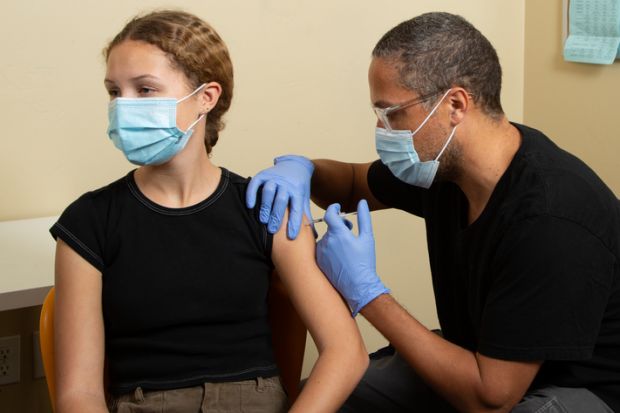US college students largely endorse mandatory Covid vaccine requirements for their return to campus in the autumn, but with some exceptions reflecting the nation’s strident partisan divide, a national survey has found.
The poll of more than 2,000 US college students by Inside Higher Ed and College Pulse found mandatory vaccine policies supported by a margin of 24 per cent to 69 per cent.
The wide gap favouring such a rule suggests college students are eager to resume the traditional campus experience, according to Kaplan, an educational services company that sponsored the survey.
“We think these survey results reflect their eagerness to return to normalcy and their general trust in science,” said Isaac Botier, the executive director of college admissions programmes at Kaplan.
Yet behind that picture of relative harmony, Mr Botier and other experts acknowledged, remained the nation’s ongoing political theatre and the problems it posed for both higher education and public health.
The survey found that campus vaccine mandates were backed by 90 per cent of students who identified most closely with the Democratic party, but by only 37 per cent of those aligned more with the Republican party.
A similar picture is seen among the more than 400 colleges and universities that, according to a tally by The Chronicle of Higher Education, already plan to require vaccinations for their students this fall. Fewer than one in 10 of those campuses are in states that voted for Donald Trump last year.
It is a public health problem that the Biden administration has been trying to solve. Most US adults have now been fully vaccinated against Covid, and nearly two-thirds of them have had at least one shot, according to federal data.
Yet the administration is having trouble raising those numbers much higher in the face of partisan posturing on the topic. Its responses include teaming up with a major beer company to promise free drinks if the country reaches the 70 per cent level by the 4 July holiday, and creating a “Covid-19 College Challenge” that encourages on-campus vaccination sites and various student-led publicity and educational campaigns.
The Kaplan survey portrays the nation’s background level of obstinance extending to students, with 40 per cent of those opposed to vaccine mandates saying that they probably or absolutely would transfer if their current institution imposed such a requirement.
Such talk shouldn’t necessarily be taken seriously, said Mr Botier of Kaplan, especially given the growing number of institutions adopting vaccine mandates.
“We think some students said they would transfer as a way to demonstrate their overall disagreement with a mandate,” he said. “Limited alternative options will likely cause many to rethink.”
The rhetoric is nevertheless an unwelcome sign of higher education getting drawn further into broader political tensions, Mr Botier said. “This may bode poorly for any near-term moment of unity, even amid general excitement that campus life may return to normal” this autumn, he said.
Vaccination requirements also may pose trouble for one critically important cohort of students who may be very willing to get them — the 10 million international students that US colleges typically host each year, generating more than $40 billion (£30 billion) in revenue. US higher education leaders have acknowledged concern that many of those students are in countries that either have too few vaccines or offer versions that are not recognised by US health authorities.
US colleges so far have been planning a mix of strategies that includes vaccinating overseas students upon arrival and allowing them to isolate and attend classes online for the two weeks understood as necessary for the jab to take full effect.
Register to continue
Why register?
- Registration is free and only takes a moment
- Once registered, you can read 3 articles a month
- Sign up for our newsletter
Subscribe
Or subscribe for unlimited access to:
- Unlimited access to news, views, insights & reviews
- Digital editions
- Digital access to THE’s university and college rankings analysis
Already registered or a current subscriber? Login







